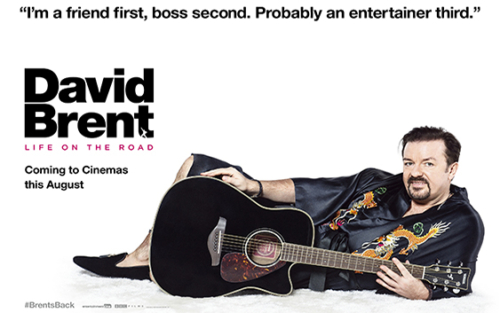David Brent: Life on the Road (2016)
Director: Ricky Gervais
Starring: Ricky Gervais, Ben Bailey Smith, Tom Basden, Jo Hartley, Mandeep Dillon, Tom Bennet, Andrew Brooke & Miles Chapman.
Plot: Ex-manager of Wernham Hogg and star of the BBC mockumentary ‘The Office’, David Brent (Ricky Gervais), makes a comeback after having twelve years out of the ‘limelight’. Brent decides to postpone his current job at a sanitary product company to pursue his dream of becoming a rock star.
*Spoiler Alert*
David Brent: Life on the Road sees the return of David Brent (Ricky Gervais), the main character of the mockumentary The Office, and begins with a monologue from the protagonist himself, thus reintroducing the Brent character twelve years after his role as the manager and ‘chilled out entertainer’ of the paper merchant, Wernham Hogg. Gervais reprises his role as the comical character and is nothing short of fantastic; it is as though the character never left the screen. To the delight of fans of the original series, Brent’s desire to become a fully-fledged musician is still well and truly alive despite being stuck as a sales representative for a sanitary company named Lavichem.
The plot of Life on the Road centres around the character of David Brent, without any other characters from the original series despite how nostalgic and great that would have been. Sure, the film was about Brent’s most recent chapter in his life chapter, but who wouldn’t want to see the likes of Gareth Keenan make a brief appearance?
Instead, Brent takes leave from his new place of work in this film and forms a band he calls ‘Forgone Conclusion: Mark Two’ with Dom Johnson (Ben Bailey Smith) – an aspiring rapper – and a group of musicians. The new ensemble embarks on a tour funded entirely by the protagonist himself (using his pension schemes). Brent sees this as an opportunity to get discovered by a record company, although the ‘dream’ he has envisioned is a mere façade. Brent hires a tour bus, but is instructed by the band that he must follow behind in his car due to the apparent lack of room in the bus itself, to which Brent shrugs off despite the group’s obvious embarrassment of being seen with him, which is humorous to watch in the sense that whenever Brent initiates a joke he is bombarded with awkward stares from his intended audience who do not laugh at the protagonist’s inept sense of humour. Importantly, the role of irony becomes evident in the film once the reformed version of Brent’s group begins to tour. An example of this notion is presented when Brent arrives at a hotel room and says ‘Life on the road, love it! It’s all here – tea and coffee’, the suggestion of which carries comedic irony as one would not associate such beverages with the lifestyle of a rock and roll star, thus highlighting Brent’s illusions of grandeur, a factor embedded within the narrative of the Gervais film. Brent believes that he is a comedian and a successful musician, but the plot of the film, much like the The Office, unravels how delusional Brent is when it comes to the notion of stardom.
This is precisely what makes Gervais’ character so magical; he adheres to the ‘embarrassing uncle at a wedding’ archetype. Brent is perceived by his audience, fellow employees and his band members as cringe-worthy despite his intentions to impress them. The character is, however, grounded in an ultimately admirable and relatable context – Brent, who has a 9 to 5 itinerary, possesses the desire to live out his dream – and he’s perhaps more determined than the average person. ‘At least I never gave up’ says Brent at one stage, something that is indicative of one of his more admirable character traits. It’s these things that make Brent so relatable, as he is not the typical ‘hero’ that is usually prevalent in film, but instead a slightly extraordinary ordinary man; if Kryptonite is Superman’s flaw, then Brent’s is being misunderstood, which is much more human, identifiable and moving to witness.
The film itself was, like The Office, shot in a mockumentary style, with the cast members showcasing their opinions (mainly on Brent) in monologues like those within the fly-on-the-wall genre. This added a unique sense of sincerity into the film itself, aiding the instantaneous laughter felt at the more cringe-worthy moments that Gervais’ Brent has; you just never know what he is going to say next. Perhaps vitally to the success of the film, you also feel for the character, especially when he’s ignored or shunned by his contemporaries. One such an example is when Brent is humiliated by a radio host for not having a record deal – it almost makes you wish that he had. Ultimately, the journey of the picture is encapsulated by Brent’s earning of respect from his peers, something he rarely found in the television show. The film concludes with Brent returning to his job at Lavichem where he is welcomed by his good friend Nigel Martin (Tom Bennett), along with receptionist Karen Parashar (Mandeep Dillon) and co-worker Miriam Clarke (Rebecca Gethings), who scold the office bully, Jezza Collins (Andrew Brooke), for tormenting Brent over his failed shot at stardom. The final shot is of Clarke and Brent holding hands, which is poignant as it showcases that the character has essentially found kindred spirits in those who matter the most despite his failed shot at fame, and that he does not need stardom to gain acceptance from others, fulfilling the character’s need of being accepted; a profound note to end on overall.
This is certainly a movie to catch if you’re fans of the original The Office, the fly-on-the-wall mockumentary style or comedy as a whole, and I would certainly watch this again.
17/24


